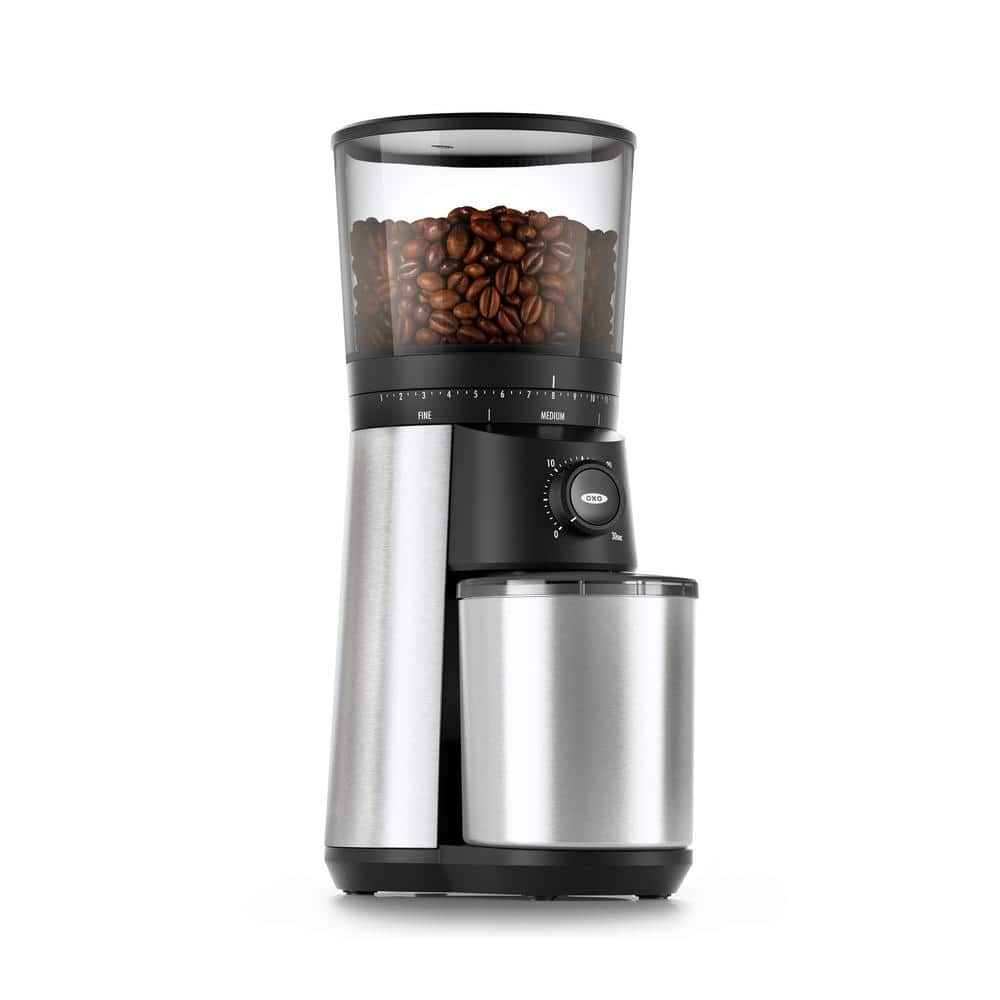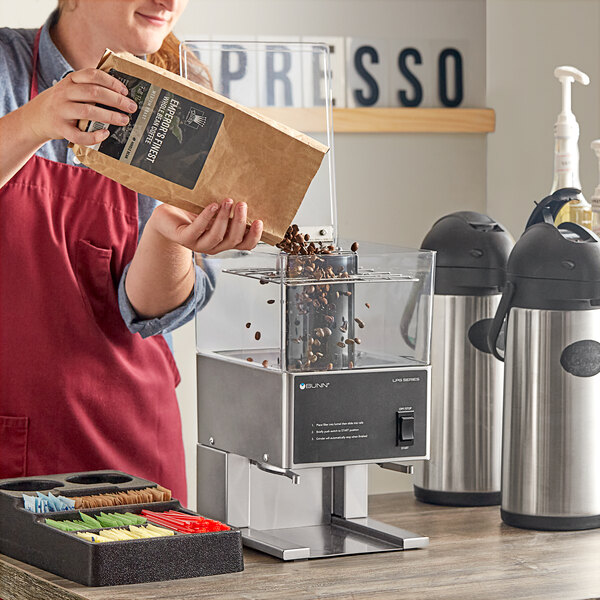How an Industrial Coffee Grinder Can Boost Your Coffee Quality
How an Industrial Coffee Grinder Can Boost Your Coffee Quality
Blog Article
Exactly How to Select the Perfect Industrial Coffee Grinder for Your Organization
Selecting the suitable industrial coffee grinder for your business is a diverse choice that calls for careful consideration of numerous crucial variables. Additionally, comprehending the numerous types of grinders offered can substantially affect your operational efficiency.
Assess Your Grinding Requirements
When picking an industrial coffee grinder, one need to initially analyze their grinding needs to guarantee ideal efficiency and uniformity. This first evaluation involves understanding the quantity of coffee to be processed daily, in addition to the preferred grind size for different developing techniques. A high-capacity mill may be essential for services offering huge amounts of coffee, while smaller sized procedures could locate an extra compact design adequate.
Moreover, it is necessary to take into consideration the sorts of coffee beans being utilized, as various beans may need particular grinding techniques to achieve the very best flavor profile. Oily beans may necessitate a grinder made to deal with such attributes without overheating or clumping.
Specialized coffee companies frequently demand accurate work sizes to improve removal and taste, making it important to select a mill that can deliver uniform outcomes. Evaluating the offered area and electric needs will assist in picking a mill that fits seamlessly into your functional operations.
Understand Mill Types
Comprehending the different kinds of commercial coffee grinders is essential for making an educated selection that meets certain functional needs. There are mostly 2 groups of mills: blade mills and burr mills.
Blade mills make use of spinning blades to chop the coffee beans, causing an irregular work dimension - Industrial Coffee Grinder. While they might be more inexpensive, they are typically not appropriate for industrial applications where precision is necessary
On the various other hand, burr mills give an extra consistent work by squashing the beans between two surfaces. They can be further categorized right into level burr and conelike burr grinders. Flat burr grinders offer a consistent work dimension and are usually preferred for coffee preparation, while conical burr mills are functional and can manage a range of brew approaches, from coffee to French press.
When selecting a grinder, think about the specific demands of your company, including desired work consistency, manufacturing quantity, and the kinds of coffee beverages you plan to supply - Industrial Coffee Grinder. Each grinder type has its limitations and benefits, so comprehending these nuances enables educated decision-making that lines up with operational objectives
Evaluate Grind Dimension Uniformity
Attaining grind size uniformity is necessary for producing high-quality coffee, as variations in bit size can significantly impact removal and taste. When picking an industrial coffee mill, it is important to evaluate just how well the device maintains harmony in grind dimension across various batches. Inconsistent grind dimensions can result in irregular extraction, leading to a mug that may taste weak or extremely bitter.
To evaluate work dimension consistency, consider mills with functions such as flexible grind see settings and high-quality burrs. Burr mills, in certain, stand out in generating uniform fragment dimensions compared to blade grinders. The material and form of the burrs play an important duty, with stainless steel and ceramic choices offering longevity and precision.

Take Into Consideration Production Ability
In the fast-paced world of coffee production, go to my site thinking about production capability is extremely important for businesses intending to meet need without giving up quality. The production capability of a commercial coffee mill straight affects a business's capability to accomplish orders efficiently, manage inventory, and respond to varying market patterns.
When evaluating production capability, it is important to examine the grinder's outcome rate, generally measured in pounds per hour. This measurement needs to straighten with your organization's predicted sales volume and growth targets. For instance, a café with a high turnover might need a grinder that can process numerous hundred pounds daily, while a smaller operation could be sufficient with a lower capacity version.
Additionally, take into consideration the kind of coffee being processed. Different beans and blends might impact grinding rate and effectiveness, necessitating a mill qualified of managing diverse manufacturing demands. It's additionally worth factoring in the grinder's ability to preserve consistent top quality under high outcome problems, as any type of changes can affect the last product.
Inevitably, selecting a mill that matches your service's manufacturing capability will guarantee you continue to be responsive and affordable to consumer assumptions.

Budget and Upkeep Aspects
When evaluating the ideal industrial coffee mill, budget and upkeep elements play a significant function in the total decision-making process. A preliminary financial investment in a high-quality grinder can generate lasting benefits, but it's necessary to develop a clear spending plan that aligns with your service's functional needs. Consider both the purchase cost and potential operational expenses, such as energy consumption and replacement parts.
Upkeep is one more essential facet that can influence your spending plan. Industrial coffee mills call for regular maintenance to guarantee ideal performance and longevity. Review the manufacturer's recommendations for maintenance, including cleansing timetables and components substitute, as get more these will certainly impact long-term operational expenses. Additionally, think about the accessibility of service and support, as reputable help can mitigate downtime and fixing expenditures.

Investing in a mill that is long lasting yet easy to keep can save cash gradually. While lower-priced options may be tempting, they might incur greater maintenance expenses and decreased effectiveness. Eventually, balancing first costs with lasting upkeep and operational performance will lead you to the most effective choice for your company's coffee grinding demands.
Verdict
Selecting the perfect industrial coffee mill necessitates an extensive examination of grinding demands, mill kinds, grind dimension uniformity, manufacturing capability, and financial factors to consider. An appropriate mill not just boosts the top quality of the coffee generated yet also adds to the overall success and success of the enterprise.
Specialized coffee businesses typically demand specific grind dimensions to improve extraction and flavor, making it important to choose a mill that can supply consistent results. Flat burr mills supply a constant work size and are usually favored for espresso prep work, while conelike burr mills are versatile and can take care of an array of brew methods, from espresso to French press.
When picking a commercial coffee grinder, it is crucial to review how well the maker preserves harmony in grind size throughout various sets. Burr grinders, in specific, succeed in creating uniform fragment sizes compared to blade grinders.Selecting the optimal industrial coffee mill necessitates a comprehensive evaluation of grinding demands, mill types, grind dimension consistency, manufacturing capability, and budgetary factors to consider.
Report this page